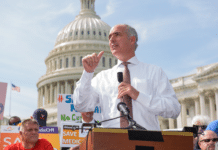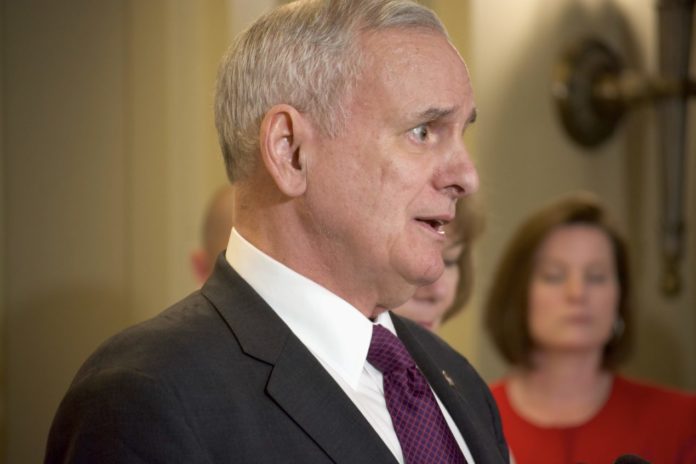ST. PAUL, Minn.- Members of the Republican leadership of the Minnesota Legislature have formally filed a lawsuit against Gov. Mark Dayton.
The lawsuit stems from a letter Dayton sent on May 30 to the President of the Senate Michelle Fischbach, Speaker of the House Kurt Daudt (R-Crown), and Senate Majority Leader Paul Gazelka (R-Nisswa), indicated his veto of two appropriation items, which fund the legislature.
“[Your] job has not been satisfactorily completed, so I am calling on you to finish your work,” Dayton wrote in the letter. “However, I will allow a special session only if you agree to remove the following provisions.”
The provisions included tobacco tax breaks, estate tax exclusion increases, corporate income tax freeze, drivers license provision, and teachers license provision. This move means that “beginning on July 1, 2017, the Senate and House will not have operating appropriations for fiscal year 2017-2018.
The lawsuit points out the legislature “cannot meet in session and therefore cannot override Governor Dayton’s line-item vetoes because the special session was adjourned sine die (without appointed date for resumption).”
The lawsuit claims that “Governor Dayton violated the Separation of Powers Clause of the Minnesota Constitution when he line-item vetoed the Minnesota Legislature’s funding for the 2018-2019 fiscal biennium. The vetoes impermissibly control, coerce, and restrain the action of the Legislature in the exercise of its official and constitutional powers and duties.” As such the lawsuit claims that the governor’s vetoes are “unconstitutional, null, and void.” The meaning of this last piece is that if the suit goes through then the two items which Dayton vetoed will become law with the rest of the Omnibus State Government Appropriations bill. The role of the court at this point will be to determine the constitutionality of Dayton’s actions through declaratory judgement.
The lawsuit also asks for injunctive relief, which will mean that the actions of Dayton’s vetoes (defunding of the legislature) would cease prior to July 1, thus negating the need for monetary losses experienced by members of the legislature and legislative staff. In order for an injunctive relief to be granted, the legislature will have to prove that they will suffer irreparable harm if the injunction is not granted and that the balance of hardships tip in the legislatures favor.
“I’m hopeful that the court will step in to provide immediate injunctive relief so the legislature can continue its operations, and then quickly rule that the governor’s actions unconstitutional,” Gazelka told Alpha News. “However, we’re not taking anything for granted. The people of Minnesota understand that cutting off funding for the legislature eliminates their voice in state government and undermines our democracy, and I’m optimistic the courts will see it the same way. If the governor can defund the legislative branch today, tomorrow he could do the same to the judicial branch.”
The lawsuit is also asking for a mandamus relief upon the Commissioner of Minnesota Management and Budget office, demanding that the MMB comply with the Minnesota State Constitution, and provide the necessary funding so that the legislature can meet its obligations. Essentially, a mandamus relief is asking a government office (or other decision making body) to carry out the functions required of it it by law.
The cutting off of appropriations could have some serious financial implications, which could reach far beyond legislators and their staff.
“The first problem we’ll run in to is an inability to make payments on the new Senate Office Building,” Gazelka said. “Republicans believed it would be a waste of money to build it in the first place, and we disagreed with the way it was financed. Now it turns out we were right. If payments aren’t made, it will put the entire state’s bond rating in jeopardy.”
Currently, the MN Senate budgeted $8 million on the payments for the Senate office building. Many in the legislature have stated that they would have to move this money around to paying staff if the appropriation do not come through.
However, Gazelka did find some positives in the legislative session.
“Ultimately, we fought hard to pass the biggest tax relief package in nearly two decades, dedicate existing tax revenues to roads and bridges, and begin reforming the broken health care system,” Gazelka said. “It’s the best outcome we could have hoped for with a DFL governor. The final year of Gov. Dayton’s term should be less contentious, because the two-year budget is already passed and signed into law.”


















